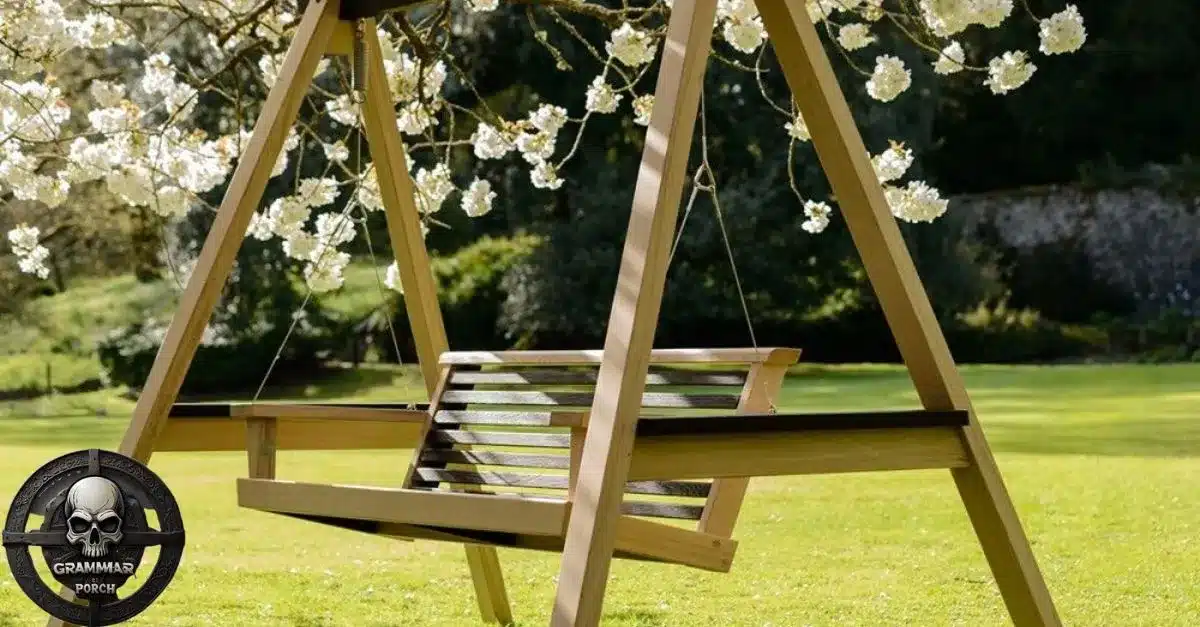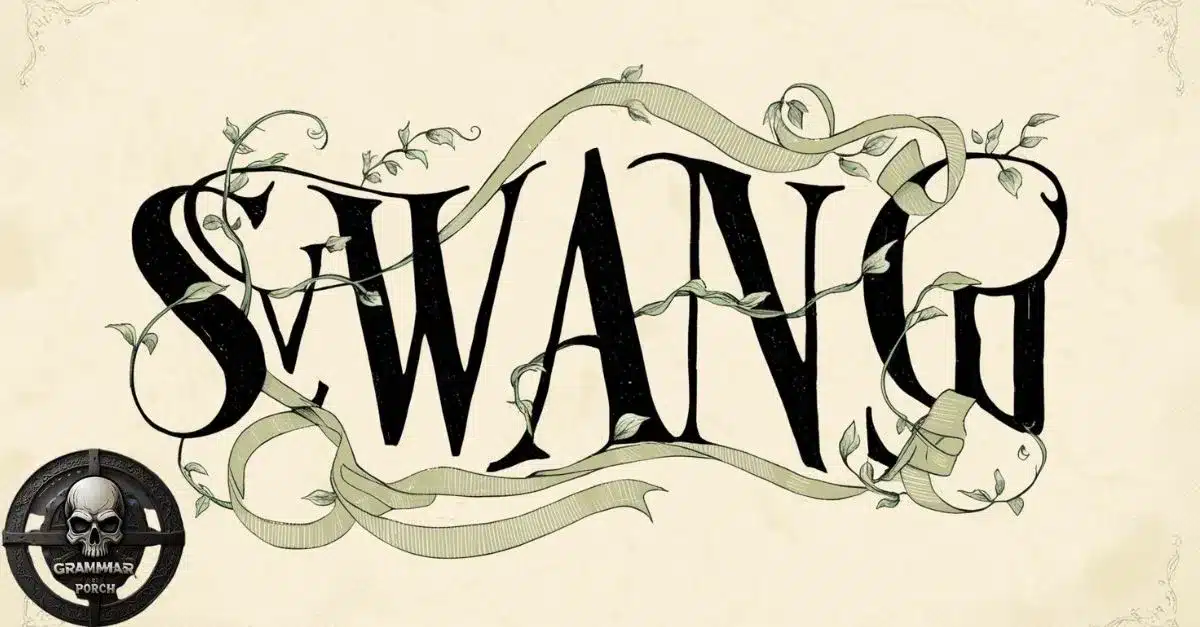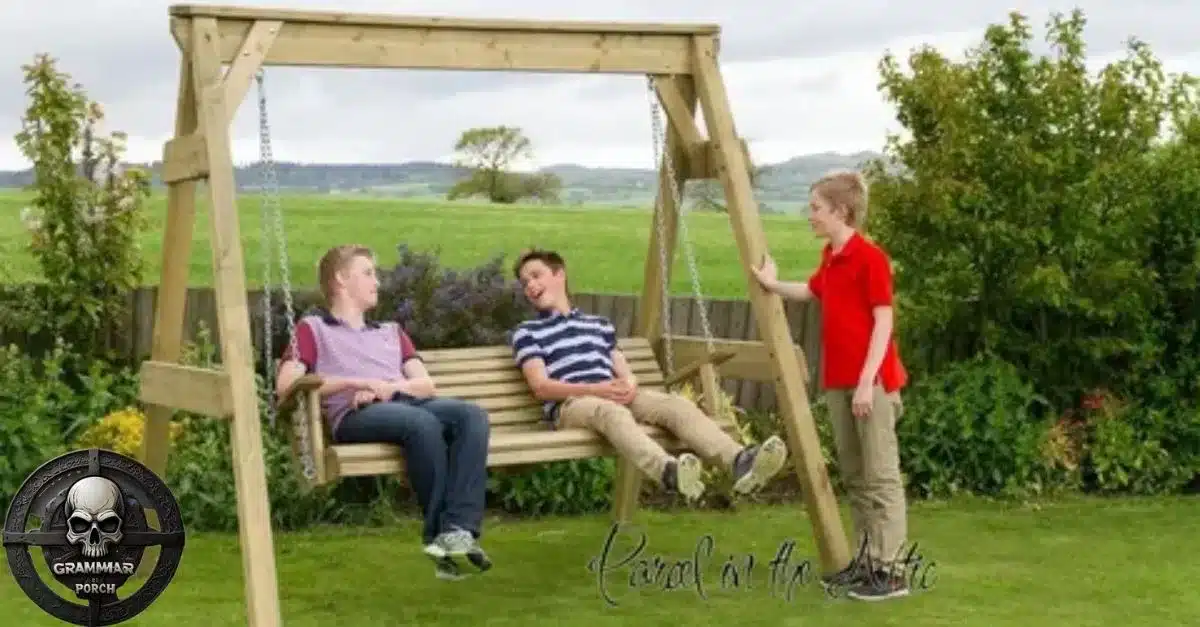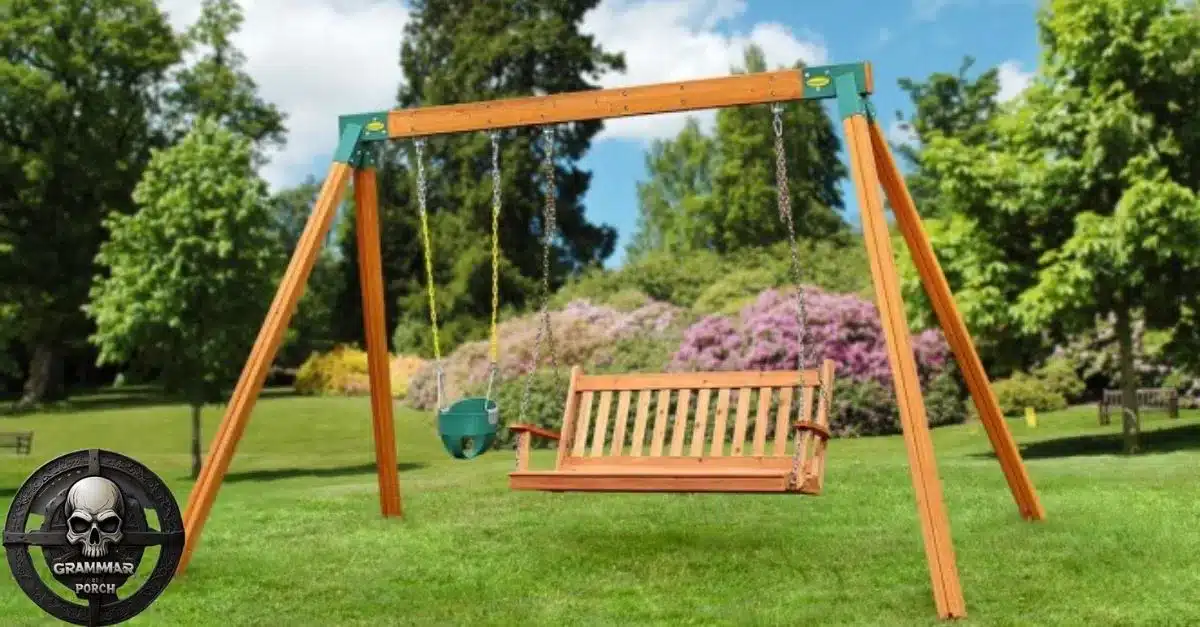English verbs can sometimes be tricky, especially when we need to use them in different tenses. With a word like “swing,” it can be challenging to know which past-tense form is correct:
“swing,” “swang,” or “swung.” This article will explore each of these terms, their meanings, and when to use them. Let’s dive into each of these forms to find out which one fits best in standard usage.
Is the Swing Word Correct?

Swing” is the base or root form of the word and is primarily used in the present tense. When you see people on a macrame swing, a wooden swing, or an outdoor swing, “swing” describes the action happening now.
It’s versatile and widely used, whether you’re talking about a handmade swing moving in the breeze or a swing chair on a porch. However, “swing” is not typically used for actions in the past tense, as English verbs often change form to indicate time.
Definition
In its base form, “swing” generally means “to move back and forth” or “to sway.” You might picture a hanging swing in a backyard or a leather swing gently moving indoors.
Meaning
“Swing” is used to describe a movement with a repeated or rhythmic motion. It often implies leisure or play, as in “Children love to swing on the backyard swing,” or “The macrame wall hanging swings in the breeze.”
Is the Swang Word Correct?

“Swang” is a form of the word that’s occasionally used, especially in informal or dialectal English. Some people might say, “He swang on the patio swing all day,” or “She swang across the playground on the artisan swing.
” While “swang” sounds right to some people, it’s not widely accepted in formal writing or speech.
Definition
“Swang” is an informal, nonstandard past-tense form of “swing.” It doesn’t appear in major dictionaries as the correct past tense, but you may hear it used in specific dialects or informal settings.
Meaning
Though it might be understood as the past tense of “swing” in casual conversation, “swang” is not commonly recognized as correct. It’s best avoided in professional or academic writing, where standard grammar rules apply.
Is the Swung Word Correct?

Yes, “swung” is the correct past tense and past participle form of “swing.” If you’re talking about an action in the past—like a large family swing bed gently moving, or a boho swing hanging in a garden—”swung” is the form you should use.
Definition
“Swung” is the standard past-tense form of “swing,” used to describe any action of swinging that took place in the past.
Whether you’re describing a chic hammock that swung in the breeze or a vintage swing used years ago, “swung” remains the right choice.
Meaning
“Swung” indicates that the action of swinging has already happened. You might say, “The children swung on the swing chair all day,” or “The solid wood chair swung back and forth in the living room.”
Quick Summary
- “Swing” is the correct form for the present tense.
- “Swang” is informal and rarely correct.
- “Swung” is the correct past tense form of “swing” in standard English.
| Form | Tense | Example |
| Swing | Present | “They swing on the elegant swing.” |
| Swang | Informal Past | “He swang on the lawn swing.” |
| Swung | Standard Past | “They swung on the luxury hammock.” |
Swing in Tenses
Let’s look at “swing” in all tenses to see how it changes based on time. Here’s how it functions across past, present, and future.
Past Tenses
| Tense | Example |
| Simple Past | “The timber swing swung in the wind.” |
| Past Continuous | “They were swinging on the cozy chair.” |
| Past Perfect | “They had swung on the garden swing all day.” |
| Past Perfect Continuous | “They had been swinging on the rustic swing for hours.” |
Present Tenses
| Tense | Example |
| Simple Present | “She swings on the outside swing.” |
| Present Continuous | “They are swinging on the designer swing.” |
| Present Perfect | “They have swung on the artisan swing many times.” |
| Present Perfect Continuous | “They have been swinging on the solid wood chair for a while.” |
Future Tenses
| Tense | Example |
| Simple Future | “They will swing on the handmade swing.” |
| Future Continuous | “They will be swinging on the elegant swing.” |
| Future Perfect | “They will have swung on the ceiling swing by the time the event ends.” |
| Future Perfect Continuous | “They will have been swinging on the lawn swing all afternoon.” |
Pronunciation of Swing, Swang, or Swun
Each word has a unique pronunciation:
- “Swing” sounds like “sing.”
- “Swang” sounds like “rang.”
- “Swung” rhymes with “rung.”
Side-by-Side Comparison of Swang or Swung
| Word | Correct Usage | Example |
| Swang | Informal | “She swang on the backyard swing.” |
| Swung | Standard | “They swung on the designer swing.” |
Which One is More Acceptable: Swang or Swung?
“Swung” is more widely accepted and should be used in all formal writing. “Swang” might be occasionally used in dialect or informal speech, but it isn’t considered correct.
Trick to Remember the Difference
An easy trick to remember is that swung sounds like “sung” (the past tense of “sing”), both of which follow a similar past-tense pattern.
Origins of Swing

“Swing” originates from the Old English word “swingan,” which originally meant “to whip or strike.” Over centuries, it came to represent a back-and-forth motion, bringing us the meaning we know today.
Synonyms of Swing
- Sway
- Rock
- Shake
- Pivot
- Lilt
- Undulate
- Oscillate
- Fluctuate
- Seesaw
- Careen
Everyday Usage Examples

Swing
- They swing on the macrame swing every evening to relax.
- She loves to swing on the leather swing while reading her book.
- The kids swing back and forth on the outdoor swing in the backyard.
- He watches the wooden swing gently swing in the breeze.
- I swing on the swing chair every morning to enjoy the sunrise.
- The handmade swing swings under the tree, casting shadows on the grass.
- They swing together on the large family swing bed, laughing and chatting.
- The boho swing adds a unique touch to the garden as it swings softly.
- The stylish hammock can swing both indoors and outdoors for extra relaxation.
- She watches the rustic swing swing gently, creating a calming rhythm.
Swang
- He swang on the patio swing all afternoon until he fell asleep.
- They swang on the garden swing, taking turns pushing each other.
- She swang on the artisan swing with her friends during the party.
- They all swang together on the backyard swing, laughing loudly.
- The wood-crafted swing swang as the wind picked up.
- He swang on the lawn swing after a long day at work.
- She swang on the chic hammock to enjoy the sunset view.
- They swang on the vintage swing, telling stories from their childhood.
- The children swang on the ceiling swing until dinner time.
- They swang on the multi-seat swing at the playground, taking turns.
Swung
- They swung on the designer swing while sipping their iced tea.
- She swung on the leather hammock in the shade, feeling peaceful.
- The children swung on the solid wood chair and laughed joyfully.
- He swung on the outside swing as he watched the sunset.
- They swung on the lounge swing while chatting about their day.
- She swung on the family hammock with her kids by her side.
- They swung on the backyard swing until it got dark outside.
- The guests swung on the artistic wall hanging while waiting for dinner.
- She swung on the hanging tapestry, feeling like a kid again.
- He swung on the extra-large swing and enjoyed the cool breeze.
FAQs
Is “swang” correct?
No, “swang” is not widely accepted in standard English.
Why is “swung” the standard?
“Swung” follows the regular past-tense formation and is grammatically correct.
Is “swinged” a word?
No, “swung” is the only correct past-tense form of “swing.”
Is “swang” used in any dialect?
Yes, but it’s rare and informal.
Can “swing” be used as a noun?
Yes, as in phrases like wood-crafted swing or group swing.
Conclusion
Choosing the right past tense of “swing” can be confusing, but using “swung” will help keep your writing clear and correct.
Whether talking about a large family swing bed or a hanging swing in the living room, knowing the right form ensures your language stays polished and professional.

Larry is an experienced blogger with a passion for simplifying grammar. With years of expertise in writing and language, he shares insightful tips on punctuation, synonyms, and the intricacies of English grammar at **Grammar Porch**. His approachable style helps readers improve their writing skills with ease.

